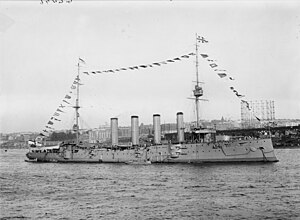HMS Drake (1901)

Drake at anchor in New York Harbor in 1909
|
|
| History | |
|---|---|
|
|
|
| Name: | HMS Drake |
| Namesake: | Sir Francis Drake |
| Builder: | Pembroke Dock |
| Cost: | approx. £800 000 |
| Laid down: | 24 April 1899 |
| Launched: | 5 March 1901 |
| Christened: | Mrs. Lort Phillips |
| Completed: | 13 January 1903 |
| Fate: | Sunk by U-79, 2 October 1917 |
| Status: | Diveable wreck |
| General characteristics | |
| Class and type: | Drake-class armoured cruiser |
| Displacement: | 14,150 long tons (14,380 t) (normal) |
| Length: | 533 ft 6 in (162.6 m) (o/a) |
| Beam: | 71 ft 4 in (21.7 m) |
| Draught: | 26 ft (7.9 m) |
| Installed power: |
|
| Propulsion: |
|
| Speed: | 23 knots (43 km/h; 26 mph) |
| Complement: | 900 |
| Armament: |
|
| Armour: | |
HMS Drake was the lead ship of her class of armoured cruisers built for the Royal Navy around 1900. She was assigned to several different cruiser squadrons in home waters upon completion, sometimes as flagship, until 1911 when she became the flagship of the Australia Station. Upon her return home, she was assigned to the 6th Cruiser Squadron of the 2nd Fleet and became the squadron's flagship when the fleet was incorporated into the Grand Fleet upon the outbreak of the First World War.
She remained with the Grand Fleet until refitted in late 1915, when she was transferred to the North America and West Indies Station for convoy escort duties. In 1916 she participated in the unsuccessful search for the German commerce raider SMS Möwe. In late 1917 Drake was torpedoed by a German submarine off Northern Ireland and sank in shallow water with the loss of eighteen lives. The wreck was partly salvaged, beginning in 1920; a fishing trawler collided with the remainder of the wreck in 1962 and sank the next day. The wrecks of the two ships were demolished during the 1970s, but their remnants remain a popular dive site.
The Drake-class ships were designed as faster and larger versions of the preceding Cressy class with a slightly more powerful armament. They displaced 14,100 long tons (14,300 t), over 2,000 long tons (2,032 t) more than the earlier ships. The Drakes had an overall length of 553 feet 6 inches (168.7 m), a beam of 71 feet 4 inches (21.7 m) and a deep draught of 26 feet 9 inches (8.2 m). They was powered by two 4-cylinder triple-expansion steam engines, each driving one shaft, which produced a total of 30,000 indicated horsepower (22,000 kW) and gave a maximum speed of 23 knots (43 km/h; 26 mph) using steam provided by 43 Belleville boilers. On her sea trials, Drake reached a speed of 24.11 knots (44.65 km/h; 27.75 mph). She carried a maximum of 2,500 long tons (2,500 t) of coal and her complement consisted of 900 officers and ratings.
...
Wikipedia
